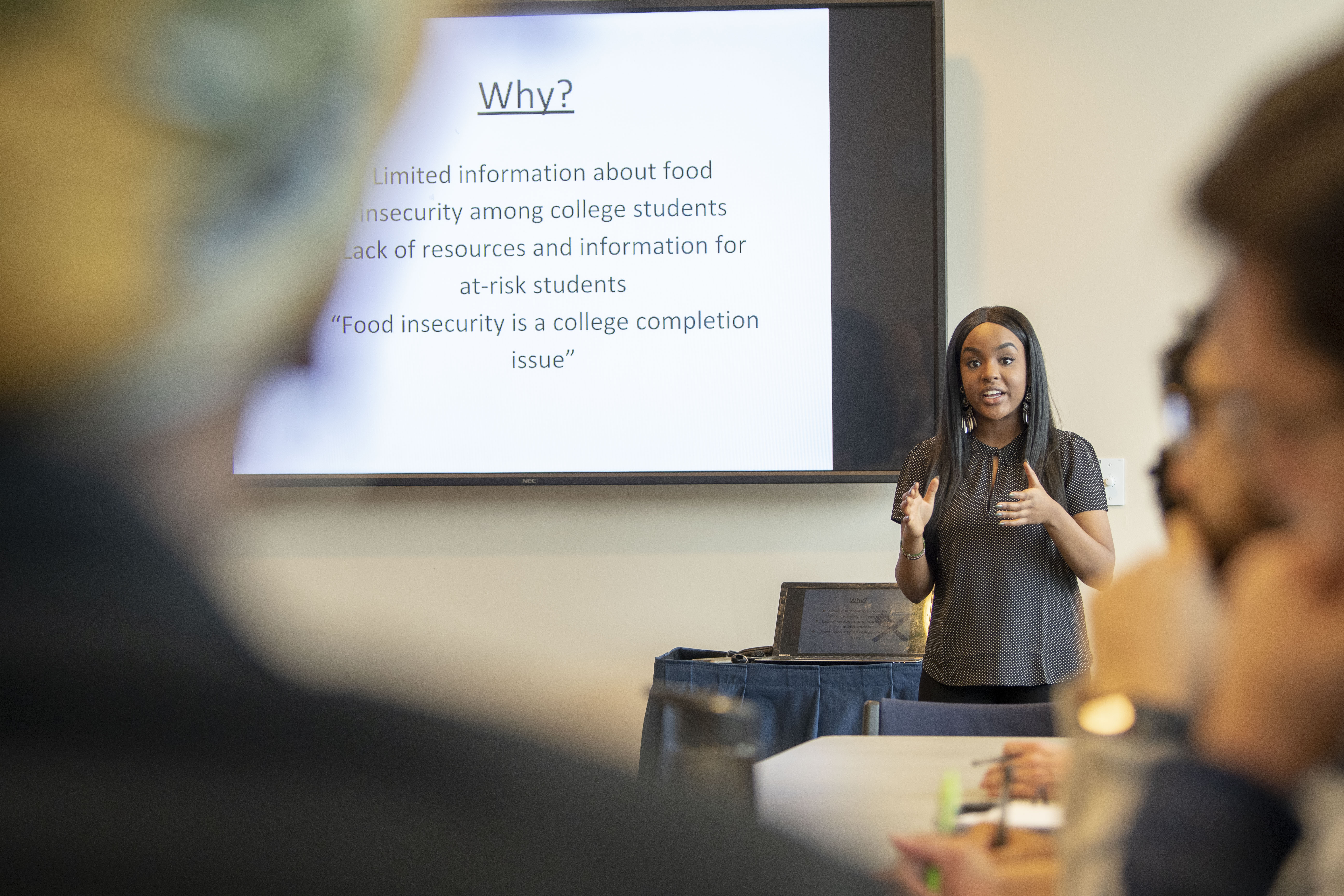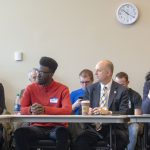On a bitterly cold and gray February morning, more than 60 people came to the Student Union for a community conversation with one of Connecticut’s U.S. Senators, sparked by two undergraduate students and the grant-supported work they are doing to quantify and address food insecurity among students at UConn.
Food insecurity – or lack of regular access to sufficient affordable, nutritious food – is a nationwide problem, that has a particular impact on the college-age population.
Students Wanjiku (Wawa) Gatheru ’20 (CAHNR) and Abhishek Gupta ’20 (CLAS) took this to heart in co-founding the UConn Access to Food Effort, or UCAFE, a new organization seeking to address food insecurity and student hunger on campus. Their initiative is backed by a $4,000 UConn IDEA grant through the Office of Undergraduate Research – an innovative grant program that supports student-designed and led projects, providing an opportunity for undergraduate creativity, artistic exploration, original research, and service-oriented projects.
“My understanding of food insecurity is lack of access to fresh, healthy, nutritious food, culturally competent food,” said Gatheru, who is continuing the project while Gupta studies abroad this semester, and who led Monday’s roundtable.
U.S. Sen. Chris Murphy ’02 JD, who helped organize the event, said that nationally as many as one in three college students are food insecure, while up to one out of five Connecticut students may be facing some level of food insecurity.
“They go days skipping breakfast or lunch or dinner. That’s a wild idea, that one third of all college students aren’t getting as much food as they need,” he said. “And the consequences are real. When you don’t have enough to eat, you are simply not ready to learn.”
He applauded the students’ efforts to be proactive in confronting food insecurity.
In founding UCAFE, Gatheru and Gupta wanted to develop research evidence of student food insecurity at UConn and to implement immediate solutions while engaging in advocacy to help address the issue long-term.
“We understood that, a lot of times, especially with institutions like UConn, data drives action,” said Gatheru. “So we wanted to make sure that we were able to have a research study and the resources to do that, to have the numbers that would be able to continue long after we were here.”
Gatheru and Gupta crafted a survey to investigate what role food insecurity played on the Storrs campus and how solutions like food pantries might be received and utilized. The survey ran for six weeks and more than 1,400 undergraduates, graduate students, and faculty and staff members responded.
The survey found that 25 percent of respondents had faced worries within the past year that they would not have enough food to eat because of a lack of money or other resources, and 45 percent of respondents were unable to eat healthy or nutritious food because they lacked resources. Thirty percent of the survey respondents had to skip meals, and 31 percent faced a time when they were hungry but did not eat because they did not have enough money.
Additionally, more than 50 percent of respondents said that they would occasionally or frequently use a food pantry if there were one available on campus and they didn’t have enough food. Sixty-one percent considered the health and nutritional benefits of their food to be very important, and 94 percent responded that they wanted to eat healthier on a day-to-day basis.
At Monday’s roundtable discussion, 5th year undergraduate student Alleyha Dannett, who has experienced food insecurity, said her mother works more than 60 hours a week to support her siblings and that, when she goes home, Dannett contributes her own funds from working two jobs on campus to help support the family’s needs.
“When you see me on campus, this is not something that you see,” Dannett said. “You see a student leader, you see all these different things, but … there’s not one look to what someone who is food-insecure looks like.”
A hallmark of UCAFE’s proactive efforts are its pop-up food closets. The first pop-up was held at the Student Union in November, and 100 students used the service, despite inclement weather that closed campus early that day.
“That was a very emotional experience for me,” said Gatheru. “Students were very open and candid about how that impacted their week. I remember talking to a student near the end and she was just like, honestly, now I don’t have to worry about my electricity bill, because I was able to get this fresh food. And I was like, this is exactly why we need to do this … the fact that there are any students dealing with this issue tells me that there need to be structures to help them.”
Two more pop-up food closets are currently scheduled for this semester, on Feb. 26 and April 24 in the Student Union.
While Gatheru and Gupta relied on financial donations and some of their IDEA grant funding to supply food for the first pop-up, other opportunities, including the potential for future partnerships, could be on the horizon.
Jason Jakubowski ’99 (CLAS), ’01 MPA, president and CEO of Foodshare Connecticut – the regional food bank serving Connecticut’s Hartford and Tolland counties – said Monday he was “stunned, absolutely stunned, by the number of students in higher education who are affected by this.”
“Please, don’t raise money and go to the grocery store and buy food for your pop-up pantries, because you’re just wasting money in that case,” said Jakubowski. “We can do a lot more with a dollar than you can because of our purchasing power.”
Long-term, Gatheru and Gupta hope to use the data they’ve generated and build on their growing grassroots support to establish a permanent food pantry in Storrs as well as services at UConn’s regional campuses. Students, staff, and advocates from other area colleges in attendance at Monday’s roundtable – including Manchester, Asnuntuck, and Middlesex Community Colleges – said that prominent, visible, and active food pantries on their campuses have helped lessen the stigma many people feel when seeking assistance, while providing access to healthy options for those facing food insecurity.
“We have a pantry at Asnuntuck, we have a pantry at Manchester Community College, we have a pantry at Capitol Community College, and at Goodwin College,” said Jakubowski. “You look at some of those, and the model’s already there. So UConn does not need to reinvent the wheel. Foodshare is absolutely ready and willing to work with you whenever … you’re ready to open a pantry here in Storrs, and I’d also like to do one in Hartford.”









